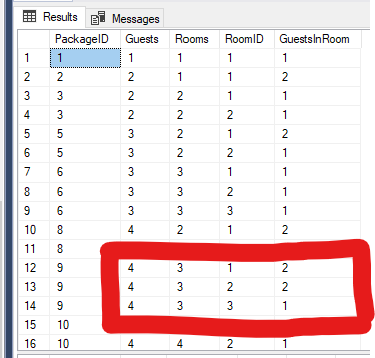I have a table of packages:
create table Package (
PackageID int,
Guests int,
Rooms int
);
insert into Package(PackageId, Guests, Rooms) values
(1, 1, 1),
(2, 2, 1),
(3, 2, 2),
(5, 3, 2),
(6, 3, 3),
(8, 4, 2),
(9, 4, 3),
(10, 4, 4)
;
I'm trying to generate a series of Occupancy (PackageID, RoomID, Guests) records by distributing the Guests over the Rooms evenly.
I've made several attempts - such as / towards:
select p.PackageID, p.Guests, p.Rooms, r.RoomID, r.Guests as GuestsInRoom
from Package p
cross apply (
select
v.[number] + 1 as [RoomID],
// Guests in room?
from master..spt_values v
where v.name is null and v.number<p.Rooms
) r
... with no success so far.
I've previously attempted to use lag() to distribute the guests. But it does not work for some specific cases:
select p.PackageID, p.Guests, p.Rooms, r.RoomID,
lag(
convert(int, ceiling((p.Guests+0.0)/p.Rooms)),
1,
convert(int, ceiling((p.Guests+0.0/p.Rooms)))
over (partition by p.PackageID order by r.RoomID
- case when (r.RoomID=max(RoomID) from #packageRooms pr where pr.PackageID=p.PackageID) and (p.Guests % p.Rooms) > 0 then 1 else 0 end as GuestsInRoom
from Package p
inner join #packageRooms r
on p.PackageID=r.PackageID
Here, in total five people are assigned to three rooms whilst there are just four guests in package #9. (It works fine, though, for many/most other packages.)
Basically, I can't find a nice way of saying "I've got four guests to distribute over three rooms."
Note: Each room as a max occupancy of two guests.
NB: Sorry - I've somehow lost track of all the the loose ends of my different attempts. Leaving me right now with (broken) code and an image not matching perfectly right now.

